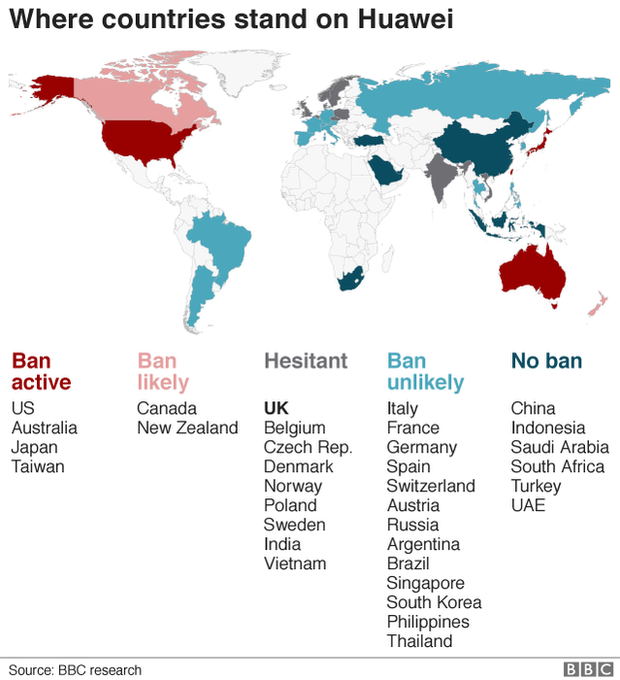
Vodafone has denied a report saying issues found in equipment supplied to it by Huawei in Italy in 2011 and 2012 could have allowed unauthorised access to its fixed-line network there.
A Bloomberg report said that Vodafone spotted security flaws in software that could have given Huawei unauthorised access to Italian homes and businesses.
The US refuses to use Huawei equipment for security reasons.
However, reports suggest the UK may let the firm help build its 5G network.
This is despite the US wanting the UK and its other allies in the "Five Eyes" intelligence grouping - Canada, Australia and New Zealand - to exclude the company.
Australia and New Zealand have already blocked telecoms companies from using Huawei equipment in 5G networks, while Canada is reviewing its relationship with the Chinese telecoms firm.
In a statement, Vodafone said: "The issues in Italy identified in the Bloomberg story were all resolved and date back to 2011 and 2012.
"The 'backdoor' that Bloomberg refers to is Telnet, which is a protocol that is commonly used by many vendors in the industry for performing diagnostic functions. It would not have been accessible from the internet.
"Bloomberg is incorrect in saying that this 'could have given Huawei unauthorised access to the carrier's fixed-line network in Italy'.
"In addition, we have no evidence of any unauthorised access. This was nothing more than a failure to remove a diagnostic function after development.
"The issues were identified by independent security testing, initiated by Vodafone as part of our routine security measures, and fixed at the time by Huawei."
A Huawei spokesperson said: 'We were made aware of historical vulnerabilities in 2011 and 2012 and they were addressed at the time.
"Software vulnerabilities are an industry-wide challenge. Like every ICT [information and communications technology] vendor, we have a well-established public notification and patching process, and when a vulnerability is identified, we work closely with our partners to take the appropriate corrective action."

Several European telecoms operators are considering removing Huawei's equipment from their networks.
But the firm's cyber-security chief, John Suffolk, has described the firm as "the most open [and] transparent company in the world".
In January, Vodafone "paused" the deployment of Huawei equipment in its core networks in Europe until Western governments resolved their security concerns about the company.
Huawei has been accused of being a potential security risk and of being controlled by the Chinese government - allegations it has always firmly denied.
With the introduction of the 5G network in the UK approaching, telecoms operators say the way it would work, in a highly integrated system alongside 4G, means that excluding Huawei is not realistic without significant cost and delay,
That would include potentially removing existing hardware, leading to the UK falling behind other countries.
The company is the world's third-largest supplier of mobile phones, behind Samsung and Apple.